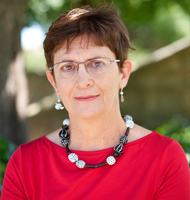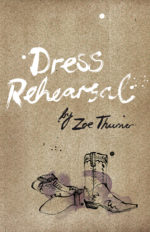AUTHOR INTERVIEW: Zoe Thurner

Debut author Zoe Thurner discusses Dress Rehearsal her novel for young adults …
The protagonist of Dress Rehearsal, Lara Pearlman, is very matter-of-fact about her weight. Her mother is more concerned about Lara’s frame than she is. Why?
Lara’s mother is a perfectionist who worries endlessly about appearances. But Lara wants to be free. Lara has vitality and embodies everything her mother fears. She does not want to be constrained by her mother’s rules, so she rebels. She eats what she wants, wears what she wants and does not worry about her weight. Instead she flaunts it because Lara knows that to become herself she must separate from her mother and enjoy the fullness of her body and her life.
In the book a high school drama production becomes the point of transformation for the students who participate in it. Is this something you have witnessed in your job as a high school drama teacher?
I once adapted a popular novel for the stage about two brothers who were fighters. The material was gritty and difficult, the group was diverse, there were a lot of big personalities with competing agendas. Rehearsals were fraught. Somebody got banned for throwing a chair. However the production process worked its magic and as the play took shape and the music was added it gathered momentum. The students began to identify with the group and yield to the joint enterprise. They came to see themselves as performers building a play together that had meaning and purpose.
You’ve written several play scripts for school productions and community theatre, but this is your first novel. How is writing a novel different?
To me, writing a play is a bit like building the foundation and walls of a house then leaving the inhabitants to furnish it. This is because the final vision of a play depends on the joint interpretation of the script by the director, actors and designers. However as a novelist I provide all the elements and I am responsible for what the reader experiences. What I especially enjoy about writing a novel is being able to describe the landscape and rooms and bodies that my characters inhabit and so direct what the reader sees.
In a novel I also have the freedom to explore all the unspoken thoughts and feelings of my characters. It took me a while to realise this. I kept throwing my characters into difficult situations to demonstrate how they would respond before I realised that I could just tell the reader directly. However I find that writing a novel can be a lonely and deceptive task without a theatre workshop to test-run the script. I think that writing a novel requires enormous stamina and self-belief.
The Australian Bookseller+Publisher says Dress Rehearsal is ‘filled with real characters, and believable conflict’. How does a writer of young adult literature achieve a believable young adult voice?
I think by being deeply interested in the problems that young people face and curious about how the characters you have created will solve those problems. I think this curiosity keeps the writer inside the characters’ skin and stops the writer from deferring to adult wisdom.
The young adult voice can be a mixture of many things but it often has a sense of immediacy and discovery. I think that by maintaining these qualities the work is kept lively and prevented from becoming weary or false.
In the book the students produce a play on the topic of world poverty, and money – having too little or too much of it – directly affects your characters. Are issues of class relevant to the lives of young Australians today?
Australia is sometimes seen as the classless society but there are big discrepancies in our education system, community services and income streams. These differences affect the kind of opportunities that young people from disadvantaged families can access. But young people’s lives are also governed by how they learn to meet life’s challenges and I think that in Australian society these differences are not completely insurmountable as they may be elsewhere.
Lara, Oggy, Chelsea, Nathan, Blake, Tom and the others are all very different characters, sometime polar opposites. Which is your favourite character and why?
I have a sweet spot for Nathan because of his loyalty to Lara but I find Oggy the most interesting character because she is full of contradictions. Oggy is petite and feminine but wears men’s boots. She is artistic and eccentric but utterly practical when it comes to financial affairs. She often finds herself in competition with Lara over intellectual ideas and romantic interests but she remains her close ally. But ultimately Oggy is a survivor and she surprises Lara by the action she takes to protect her mother and herself.
The themes of identity and selfhood are central to your novel. What shapes identity?
Identity is influenced by our environment. This includes family and social background, peer relationships and the range of experience that an individual encounters. Identity formation is a dynamic process and adolescence can be an important and exciting time for trying out new roles and seeking new experiences. But it can be a tricky balancing act as well. The process demands that you learn how to challenge the rules but remain safe, and discover how to become separate and unique while remaining in relationship. In my novel the main character goes through a difficult process of opposing her family in order to discover who and what she truly values and this shapes her idea of who she really is.
What are your current or future writing projects?
I am currently writing a young adult novel about the lives of two youths but there is a lot more work to do. I hope to rework an adult comic play that I wrote some years ago and I have also been asked to review a memoir.



